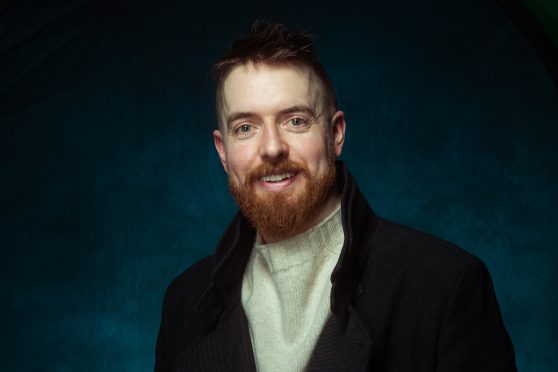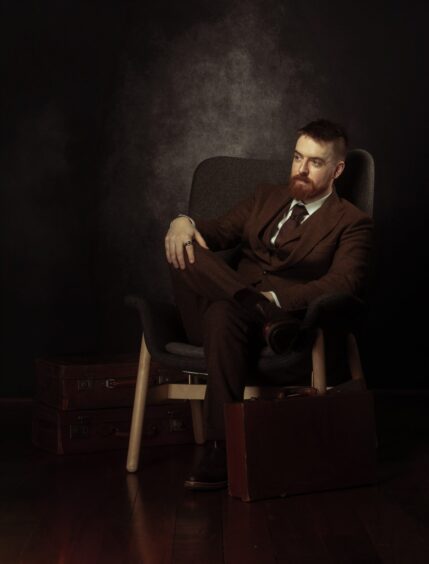
Dying is a subject often avoided or talked about in hushed tones, but not for comedian Rosco McClelland.
The stand-up, one of the brightest stars in the current wave of new Scottish comedy talent, feels acquainted with death as an old friend, and it’s even one of the only things that gets him really laughing.
He has Long QT syndrome, a rare and life-threatening heart condition that gives an increased risk of an irregular heartbeat which can result in fainting, seizures, or, worst case scenario, sudden death.
It means that confronting his own mortality isn’t just something he’ll be doing on stage as part of his upcoming Fringe show, but a lifelong burden.
“They found it when I was young,” he explained. “I was running about with my friends and I just went down.
“I remember waking up and being on the floor. It was the first time I’ve ever seen genuine panic in someone’s eyes.
“It’s an arrhythmia, your heart gets into an irregular rhythm and it’s like it’s basically pressing a reset button. While it does that, I’m not there. I’m gone.
“It was only when I was a little bit older that I found out that there’s a chance it might not reset. There’s a chance it might just turn off and then not come back on again.
“That was an interesting one to find out by myself on the Internet.”
‘The guidance is basically don’t do anything’
While it curtailed any athletic ambitions he had, Rosco hasn’t let the condition stop him living his life, despite the advice given.
“I was a wee boy who loved nothing more than running around being active,” he said. “That was my thing. My core friend group was based upon that.
“To then be told you can’t do that anymore and get pulled out football and everything athletic… It was all gone. It was strange.
“The guidance is basically just don’t do anything. Don’t stress yourself. So I thought, you know what? I’ll become a drummer, a plumber and a comedian, in that order…”
Rosco, from East Kilbride, has described previous shows as ‘punk rock comedy’ and anyone who’s been to see him will know the volume and intensity he brings in each set.
So is the condition ever on his mind?
“I’ve only thought about it once on stage and it was during the Fringe,” he said. “It was a small room and it was so hot. After the show I had people throw these fake bricks at me, which actually turned to be quite hard.
“I was getting pelted one of the days and it was just so warm that I went to step to the side and my leg went a bit jelly and I was like: ‘oh my God. You were about to go down.’
“Don’t pass out and die in front of the audience, they’ll think it’s a bit. They’ll think it’s part of the show. You’ll end up getting the award!”
Rosco tackles living with the condition with typical humour, and his Fringe show this year marks his second attempt at working his experiences into an hour of stand-up.
The first was rather different.
“I was sort of rebelling against it and the idea was me saying I didn’t care,” he said. “I was too cool to die. It won’t get me. It was bravado.
“There were nine people in one Tuesday night, two tired people and a group of seven in the front.
“They were loving it for about 25 minutes and then I started introducing the Long QT thing and talking about doing all the stuff that I shouldn’t have been doing.
“They all of a sudden went silent and I was like, well, what’s happened here? I was crushing, I was on fire.”
It turned out that the subject matter was hitting very close to home.
Rosco recalled: “A woman stood up and was visibly crying and said ‘I can’t do this anymore, I’m sorry’.
“She left and then the rest of the group just silently shuffled out. I didn’t know what to do.
“One of them came back and told me that the woman had had two kids that died of sudden death syndrome at 16. I asked the other two left in the audience if they wanted me to keep going but they were like ‘no, it’s ok’ and left. I just sat in the room for about ten minutes with my head spinning.
“The whole show was called How I Got Over and the idea is that I was finally over it, I don’t care about it. I’ll never die. It won’t get me. I’ve played chicken with my heart and won. Then during the run I get this slap of reality in the face.”
Sudden Death
This year’s show, Sudden Death, sees Rosco return to the subject with a mix of light and shade.
“I thought to myself, well, I’ll write about it, but then I found it hard. It’s difficult to open up especially being a Scottish man, we’re sort of trained not to.
“I’m aware that an audience doesn’t want a show full of doom and gloom. So I need to touch on it and go ‘this is how I feel’ and then jump back out of those wee moments and do a more silly joke.
“I feel I’m acquainted with death like an old friend. The idea of dying to me is so blasé
at this point. It’s really one of the only things that gets me laughing.
“The only reason I’ve come back to it is that it’s got to a certain stage in life where other things are priorities and it has a hand in that as well.
“Even something like having children. There’s a 50/50 chance of passing it on. Is it morally right for me to have a child when I’m passing them the same thing that’s been such an issue for me?
“The answer’s just no, really, as much as I’m fine – out of luck mostly. To pass it on knowingly doesn’t feel right.”
The Fringe is famously a tough endeavour on performers’ physical and mental health, but Rosco has established a couple of hacks to keeping on top of it all.
“The best thing I’ve started in the last few years was not being in Edinburgh for the entirety of it,” he said.
“To wake up in my own bed while I know other people are waking up hungover in a horrible shell of a flat they’ve paid £2000 in Edinburgh makes me feel so much better.
“There’s that and there’s this stoop outside the Monkey Barrel and I just like sitting there. Sometimes I’ll go through to Edinburgh earlier than I’m supposed to be there and I’ll just sit on this step.
“Other comedians will come past and I’ll talk to them, and then they’ll go and it’s not long until someone else comes past. It feels good. It’s like a communal area and I really like sitting there.”
Scottish comedy’s thriving scene
Most of the gaggle of comedians gathering at that stoop are Scottish-based acts like Rosco who are building on a hugely successful Fringe last year.
“It’s sort of like what they say about the England football team, the Golden Generation, I feel like Scottish comedy had that,” Rosco said.
“It’s strange how many of us came through at the same time and are individually doing well in our own stride.
“There’s a great group of talented artists that all decided to exist at the same time. It’s good because, secretly, everyone’s competitive, so we all want to one-up each other. It drives us forward but we also all help each other out.”
Rosco was also nominated for the Sir Billy Connolly Spirit of Glasgow Award at the Glasgow International Comedy Festival, which was eventually won by Susie McCabe.
“The thought that Billy Connolly may have watched me do a bit about how I’ve got slugs in my bin is actually really cool,” Rosco said.
“Maybe it got a laugh, not enough laughs to win it, but maybe it got a laugh from him!”
Rosco McClelland: Sudden Death, Monkel Barrel (The Hive), July 31-Aug 11, Aug 13-25, 9pm
Long QT Syndrome
Long QT syndrome is a leading cause of sudden cardiac death in young, otherwise healthy, people.
It’s a rare condition, affecting up to 1 in 2,000 people, that impacts on how the heart beats.
It’s often inherited but it can be caused by other things like medications.
Inherited heart conditions like it are often the cause of sudden arrhythmic death syndrome, or SADS.
This is when someone dies suddenly after a cardiac arrest with no obvious reason for it, for example if they are unaware they have condition.
Some who have it don’t have any symptoms and may only become aware of the condition after having an electrocardiogram (ECG) for another reason.
Those who do have symptoms can experience blackouts or fainting, seizures and heart palpitations.
The abnormal heart rhythm could be triggered by sudden noises, strenuous exercises (particularly swimming), stress or a slow heart rate during sleep.
The heart usually returns to its normal rhythm after it’s been beating abnormally.
But if it continues to beat abnormally and is not treated in time with a defibrillator, the heart will stop pumping and the person can enter cardiac arrest.
There are medications that can treat it and help control irregular heartbeats, and in some cases a pacemaker or implantable cardioverter-defibrillator may need to be fitted.
High profile incidents of sudden cardiac arrests during football matches, including Bolton’s Fabrice Muamba in 2012 and Denmark star Christian Eriksen during Euro 2020 have led to calls for more screenings for underlying heart conditions.

Enjoy the convenience of having The Sunday Post delivered as a digital ePaper straight to your smartphone, tablet or computer.
Subscribe for only £5.49 a month and enjoy all the benefits of the printed paper as a digital replica.
Subscribe © Supplied
© Supplied